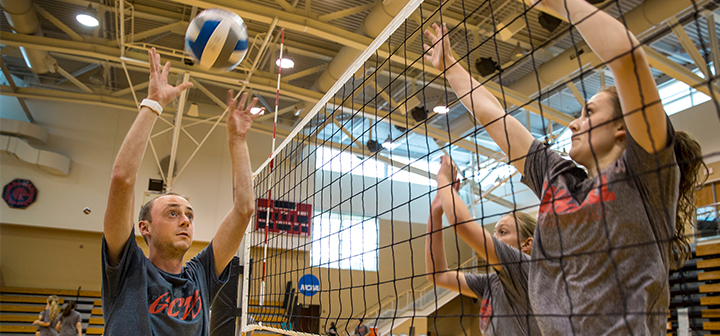
A Culture of Learning
Eric Ragan ’12 first came to Grinnell in 2008 knowing little more than that he wanted to keep playing sports in college, and he wanted to do it in a “high academic” environment.
By the end of his undergraduate career, Ragan had earned a degree in history, completed the teacher education program, and garnered all-conference athletic and academic honors in track. Most importantly, he was completely certain about launching a career as a coach and teacher.
This summer, Ragan returned to Grinnell with a master’s degree in sports studies and a passion for learning theory as the Pioneers’ new head volleyball coach. His hiring completes a circle, the arc of which began forming alongside family members in his hometown of Lander, Wyo.
“My parents were teachers and coaches, so I learned at a very young age how fulfilling that can be,” Ragan says. “My mom was our town’s volleyball coach and athletic director. I helped coach my little sisters in volleyball, and those were tremendous experiences to me. I’ve seen how sports in their lives have been so important in developing the people that they have become. Being able to give that experience to other girls and women is super important to me.”
Ragan’s relatively fast rise to a head coaching post was expedited by four years in the Division I ranks, first as a full-time assistant volleyball coach at Bucknell University and then as director of volleyball operations at Loyola Marymount University in California.
“I jumped on the opportunity at LMU because the head coach was one of the national team assistant coaches,” Ragan says. “I got to learn from one of the best coaches in the world for a year.”
Focus on process
Another post-Grinnell opportunity — also with family ties — further developed Ragan’s coaching philosophies. He and his brother Trevor founded Train Ugly, an organization dedicated to the science of motor learning, mental growth, and performance in sports, business, and life. Trevor runs the show now but Eric remains involved in summer volleyball and basketball camps for young athletes.
“The biggest part of skill development is mental, and that science tells us that focusing on outcomes is detrimental to growth,” Ragan explains. “If I’m worried about winning or getting an A on a paper, then I’m not necessarily interested in learning. But if I’m focused on the learning process, I’m going to keep getting better; and if I’m always learning and getting better, then I’m going to be improving my outcomes as well.
“That’s the kind of culture that we’ll be trying to create here,” Ragan says.
Academics and community first
The idea that skills developed in athletics should be applicable to any pursuit in life is integral to a liberal arts education, Ragan says. As a head coach building his first recruiting class, he says it’s an advantage that student-athletes who choose to come to Grinnell tend to be “self-selecting” for all the right reasons.
“I’m recruiting with the philosophy that students need to find the right fit,” Ragan says. “That means academics first. It means community culture first. Volleyball is the icing on the cake.”
That does not mean winning isn’t part of the equation. Indeed, that would miss the point of athletic competition. “If we automatically knew the outcome of a contest, sports would be boring,” Ragan says. “We love sports because there is a scoreboard; it’s about using it as a yardstick to see where we are in our process.
“Sports are great because they let us test ourselves in situations that really matter,” he says. “The magic happens when an athlete sees progress and sees they’re able to do something that they couldn’t do before. That’s when the real buy-in comes.”
To be great learners
Ragan envisions a high level of process-oriented achievement for his student-athletes at Grinnell, and he is his own best example of what success looks like.
“My experience at Grinnell as a student and as an athlete shaped my career path,” Ragan says. “I loved my experience, and I wanted to give that experience to future student-athletes.
“I saw sports here as an extended classroom — as another place to learn. At other institutions, coaches feel like they have to win or they’re going to get fired. Here, it’s about how we can facilitate learning for our student-athletes,” he says.
“Our focus is to be great learners in everything we do. That’s the culture that I wanted to be in. I saw it here as a student, and I wanted to be a part of it as a career. I’m really thankful that it happened this soon.”
